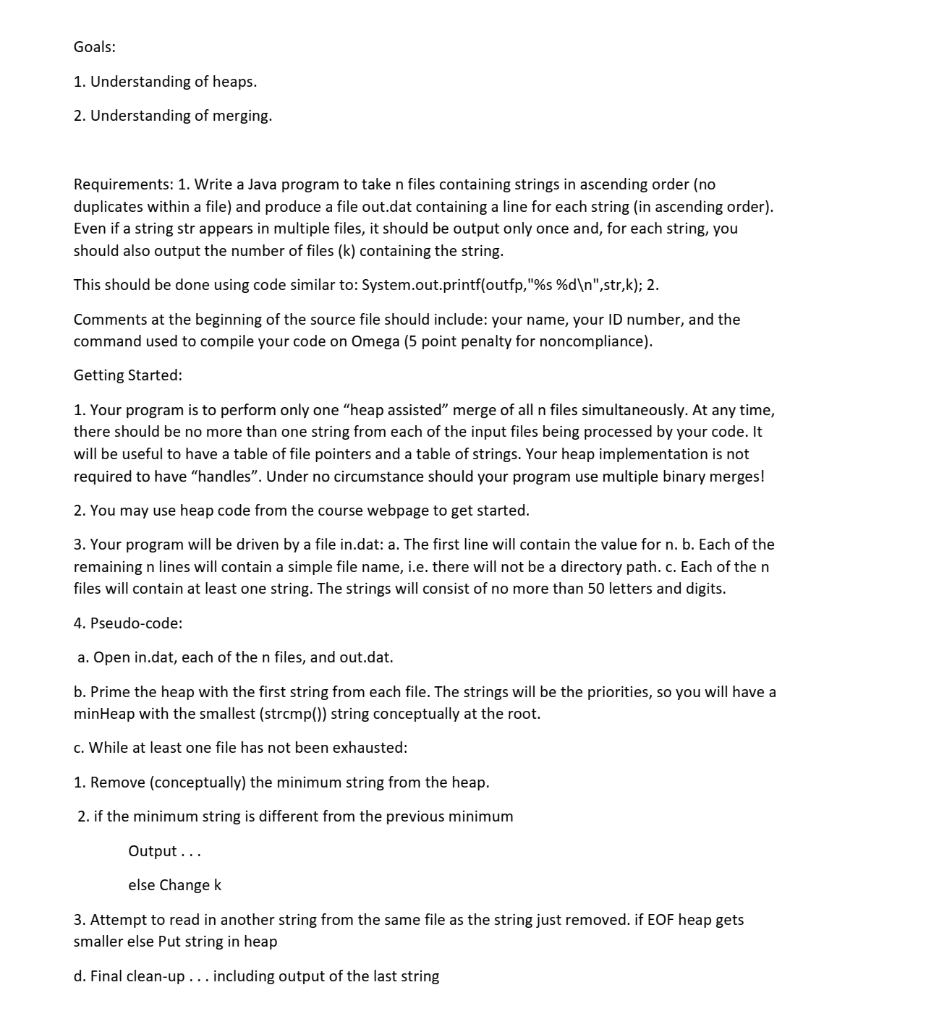Question: Can you do it in JAVA? Goals: 1. Understanding of heaps. 2. Understanding of merging. Requirements: 1. Write a Java program to take n files
Can you do it in JAVA?

Goals: 1. Understanding of heaps. 2. Understanding of merging. Requirements: 1. Write a Java program to take n files containing strings in ascending order (no duplicates within a file) and produce a file out.dat containing a line for each string (in ascending order). Even if a string str appears in multiple files, it should be output only once and, for each string, you should also output the number of files (k) containing the string. This should be done using code similar to: System.out.printf(outfp,"%s %d ",str,k); 2. Comments at the beginning of the source file should include: your name, your ID number, and the command used to compile your code on Omega (5 point penalty for noncompliance). Getting Started: 1. Your program is to perform only one "heap assisted merge of all n files simultaneously. At any time, there should be no more than one string from each of the input files being processed by your code. It will be useful to have a table of file pointers and a table of strings. Your heap implementation is not required to have "handles". Under no circumstance should your program use multiple binary merges! 2. You may use heap code from the course webpage to get started. 3. Your program will be driven by a file in.dat: a. The first line will contain the value for n. b. Each of the remaining n lines will contain a simple file name, i.e. there will not be a directory path. c. Each of the n files will contain at least one string. The strings will consist of no more than 50 letters and digits. 4. Pseudo-code: a. Open in.dat, each of the n files, and out.dat. b. Prime the heap with the first string from each file. The strings will be the priorities, so you will have a min Heap with the smallest (strcmp() string conceptually at the root. c. While at least one file has not been exhausted: 1. Remove (conceptually) the minimum string from the heap. 2. if the minimum string is different from the previous minimum Output... else Change k 3. Attempt to read in another string from the same file as the string just removed. if EOF heap gets smaller else Put string in heap d. Final clean-up ... including output of the last string Goals: 1. Understanding of heaps. 2. Understanding of merging. Requirements: 1. Write a Java program to take n files containing strings in ascending order (no duplicates within a file) and produce a file out.dat containing a line for each string (in ascending order). Even if a string str appears in multiple files, it should be output only once and, for each string, you should also output the number of files (k) containing the string. This should be done using code similar to: System.out.printf(outfp,"%s %d ",str,k); 2. Comments at the beginning of the source file should include: your name, your ID number, and the command used to compile your code on Omega (5 point penalty for noncompliance). Getting Started: 1. Your program is to perform only one "heap assisted merge of all n files simultaneously. At any time, there should be no more than one string from each of the input files being processed by your code. It will be useful to have a table of file pointers and a table of strings. Your heap implementation is not required to have "handles". Under no circumstance should your program use multiple binary merges! 2. You may use heap code from the course webpage to get started. 3. Your program will be driven by a file in.dat: a. The first line will contain the value for n. b. Each of the remaining n lines will contain a simple file name, i.e. there will not be a directory path. c. Each of the n files will contain at least one string. The strings will consist of no more than 50 letters and digits. 4. Pseudo-code: a. Open in.dat, each of the n files, and out.dat. b. Prime the heap with the first string from each file. The strings will be the priorities, so you will have a min Heap with the smallest (strcmp() string conceptually at the root. c. While at least one file has not been exhausted: 1. Remove (conceptually) the minimum string from the heap. 2. if the minimum string is different from the previous minimum Output... else Change k 3. Attempt to read in another string from the same file as the string just removed. if EOF heap gets smaller else Put string in heap d. Final clean-up ... including output of the last string
Step by Step Solution
There are 3 Steps involved in it

Get step-by-step solutions from verified subject matter experts


